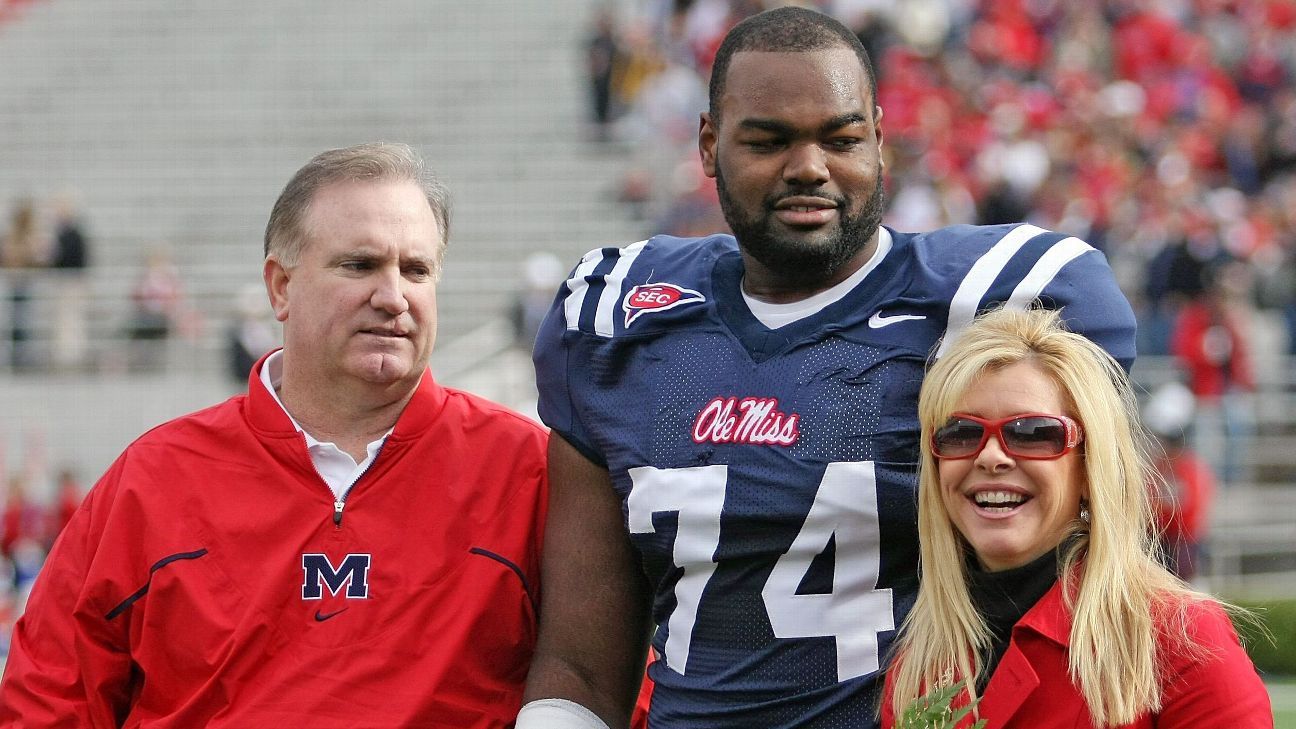Former NFL star Michael Oher, whose supposed adoption out of poverty by a wealthy white couple was the subject of the blockbuster movie “The Blind Side,” is accusing the couple of making “demonstrably false” claims in a court-ordered accounting of the money they made off his story.
In a 16-page document filed Tuesday in Tennessee’s Shelby County Probate Court, Oher alleges that Sean and Leigh Anne Tuohy did not account for $2.5 million taken from him in 2011. At the time, Oher was in his third NFL season and the Tuohys were his conservators, which gave them the legal right to forge business agreements in his name and required them to report their financial dealings with Oher to the court.
“This $2.5 million was supposedly taken to be invested for Mr. Oher, but the former Co-Conservators took the $2.5 million without permission from this Court, without any notice to this Court, and without having the Court appoint a guardian” to protect the ward’s interest, the legal filing says.
“The former Co-Conservators should be required to account for this money,” it continues.
The filing also notes that the Tuohys’ financial accounting does not mention an unspecified sum of money Oher put into a checking account he shared with the Tuohys. The legal filing alleges that Leigh Anne Tuohy regularly wrote checks from the account, including to herself for cash, without notifying the court.
The Tuohys “should be required to fully account for every dime they spent from that account,” the filing says.
A spokesperson for the Tuohys declined comment on the filing.
Overall, the Tuohys’ court-mandated financial accounting was “contradictory, confusing, false in material ways, and wholly inadequate,” Oher alleges. In their accounting, filed with the court earlier this month, the Tuohys said they paid Oher more than $138,000 — roughly one-third of what they say they earned from the 2009 movie.
Oher, who filed a petition in August alleging that the couple cheated him out of millions of dollars they earned from his life story, said the Tuohys’ accounting was “false on its face.”
Early on, the couple claimed they received nothing from the movie, or the best-selling book that preceded it. Later, they said they gave one-fifth of the movie’s royalties to Oher. Then in the accounting filed with the court, the Tuohys said they paid about one-third of the earnings to Oher.
“These inconsistencies demonstrate the inaccuracies on the face of the ‘Accounting,’ including the former Co-Conservators self-dealing and lack of meaningful negotiation on the part of Mr. Oher for his [name, image and likeness],” Oher’s latest filing says.
Beyond that, Oher said he was cheated because the Tuohys alone decided how the earnings were to be divided, allocating 80% of the money for themselves and their two children, and giving 20% to Oher.
“‘The Blind Side’ is Mr. Oher’s story,” the latest filing says. “Without Mr. Oher, there would be no movie. The Tuohys had it backwards: 80% of the proceeds should have gone to the petitioner and 20% to the Tuohy family, not the other way around.”
In his filing, Oher asks the court to order the Tuohys to produce a more detailed financial accounting of their business dealings with him. The filing also asks the court to “sanction” the Tuohys for what it calls their “willful failure to fulfill their obligations” to both Oher and the court.
“The Blind Side,” the film that immortalized the Tuohys’ efforts to help raise Oher out of poverty to the NFL, grossed well over $300 million at the box office. In his August petition, Oher alleged that a central element of the story — that the Tuohys had adopted him — was a lie perpetrated by the family to enrich itself.
Instead of adopting him, less than three months after Oher turned 18 in 2004, the Tuohys tricked him into signing a document making them his conservators, Oher alleges.
The Tuohys have vehemently denied that they cheated Oher out of any money, even as they have acknowledged that they never legally adopted him. Their lawyers have said that the couple called Oher their adopted son “in the colloquial sense.”
Since Oher filed his petition, the court has ended the conservatorship and ordered the financial accounting. Beyond the money earned by the movie, Oher has asked the couple to pay him his fair share of money the family made by using his name, image and likeness. He has also asked for unspecified compensatory and punitive damages.
